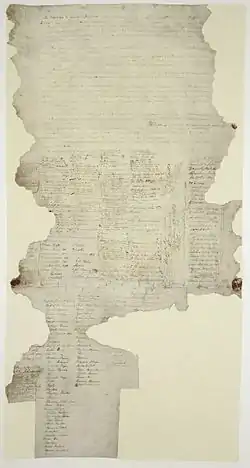Wi Parata v Bishop of Wellington
Wi Parata v Bishop of Wellington was a New Zealand court case of 1877 which ruled that the Treaty of Waitangi was a "simple nullity" having been signed by "primitive barbarians".
In 1877 Wiremu "Wi" Parata a wealthy Māori farmer and member of the Executive Council, described by the Dictionary of New Zealand Biography as having been "an astute politician and skilled orator and debater" took Octavius Hadfield, the Bishop of Wellington, to the Supreme Court, over a breach of oral contract between the Anglican Church and the Ngāti Toa, and a breach of the principles of the Treaty of Waitangi.
Ngāti Toa had provided land to the church in 1848 in exchange for a promise that a school for young Ngāti Toa people would be built by the church. However no school was built, and in 1850 the church obtained a Crown grant to the land, without the consent of the iwi. The case was a failure for Parata – Chief Justice James Prendergast ruled that the Treaty of Waitangi was a "simple nullity", having been signed by "primitive barbarians". Prendergast had simply ignored the Treaty as a legal document.
The ruling had far-reaching consequences, as it was invoked as precedent during subsequent claims brought for breaches of the Treaty, well into the twentieth century.
See also
References
- "The three precedents of Wi Parata", 2004, Canterbury Law Review
- Morris, Grant (2004). "James Prendergast and the Treaty of Waitangi: Judicial Attitudes to the Treaty During the Latter Half of the Nineteenth Century". Victoria University of Wellington Law Review. 35 (1).
- Untangling the Foreshore
